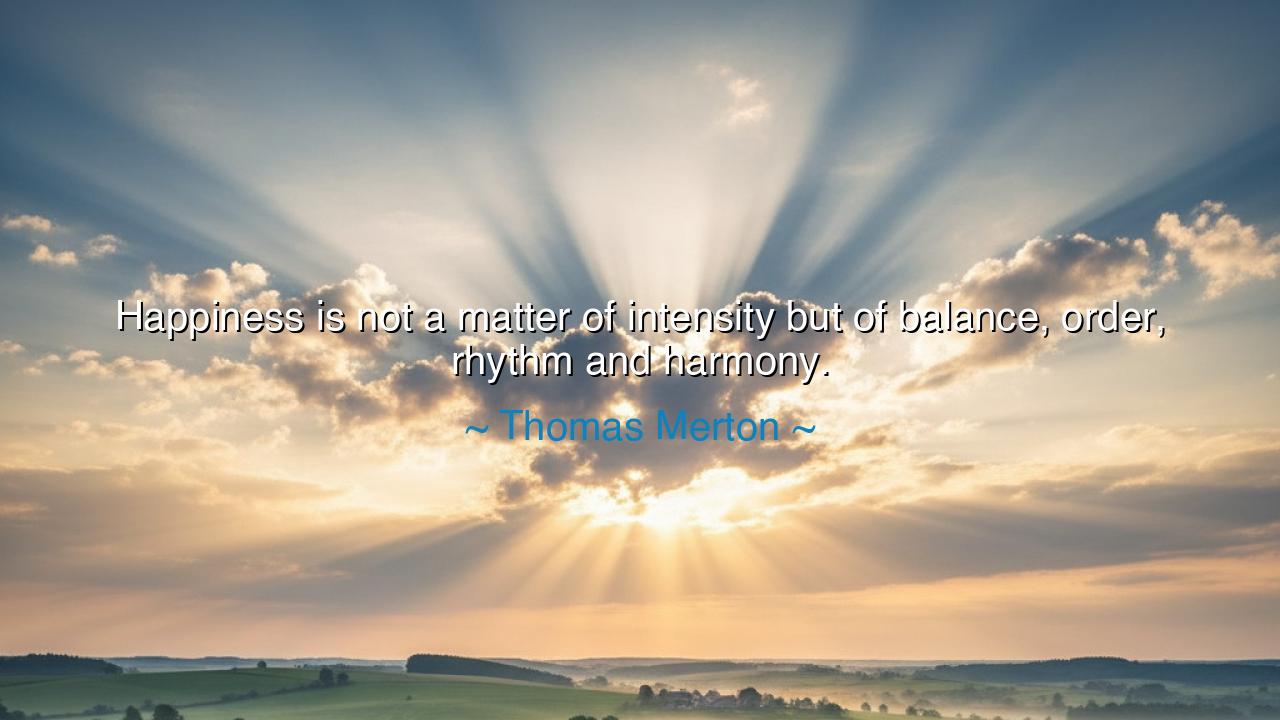
Happiness is not a matter of intensity but of balance, order






"Happiness is not a matter of intensity but of balance, order, rhythm, and harmony." So wrote Thomas Merton, the monk and mystic whose life bridged the noise of the world and the stillness of the soul. In these few words, he offers a wisdom as gentle as water and as enduring as stone—a reminder that happiness is not a flame to be chased, but a current to be aligned with. Merton, who lived within the quiet walls of a Trappist monastery yet spoke to the hearts of millions, saw what so many have forgotten: that joy does not come from frantic striving or passionate extremes, but from the calm balance of a life lived in tune with itself.
In a world that glorifies intensity, where people chase passion and pleasure as though they were gods, Merton’s words sound almost like rebellion. To him, intensity is the fever of the restless spirit—the constant hunger for more, louder, faster. It is the endless rising of waves that never rest upon the shore. Yet the wise know that such intensity burns itself out. True happiness, he says, is born not in excess, but in order, rhythm, and harmony—in the quiet alignment of body, mind, and soul with the natural pulse of life. The universe itself is balanced: the tides move in cycles, the planets turn in orbits, the heart beats in measure. To live in harmony with that rhythm is to dwell in peace.
The origin of these words lies in Merton’s own life of paradox. Before taking his vows as a monk, he lived as a scholar and writer amid the roaring modern world, drawn by both ambition and faith. When he withdrew into solitude, he did not reject life but sought its truest essence. In the silence of the monastery, he discovered that peace was not the absence of activity but the presence of order—that the soul finds its melody only when it is not drowned in noise. His contemplative writings became lanterns for a generation lost in spiritual confusion, teaching that one need not escape the world to find joy, only to bring it into balance.
The ancients understood this well. The Greeks spoke of sophrosyne—the virtue of moderation, the golden mean between extremes. They believed that happiness, or eudaimonia, could only flourish in a life of proportion and self-command. Even the universe, to them, was a symphony—a cosmos where all things moved in harmony, guided by unseen order. Merton stood in that same lineage of wisdom. He knew that when life is too intense, it fractures; when it is too idle, it stagnates. The art of living lies in finding the center between the two, where energy flows but does not consume, and stillness breathes without apathy.
Consider the life of Mahatma Gandhi, who, though he lived amidst struggle, remained balanced in spirit. He carried immense responsibility, faced unending conflict, and endured prison and pain, yet he never let anger or desire control him. His rhythm was disciplined, his order unwavering—prayer, service, and reflection guided his every day. In that harmony of purpose, he found serenity even in turmoil. Gandhi’s joy was not born from intensity of passion, but from the harmony of conviction, humility, and peace. Like Merton, he understood that the highest strength is quiet, and the deepest joy is calm.
This truth extends to every soul. We live in an age of ceaseless motion, where people confuse excitement with happiness and noise with meaning. But the human heart is not built for perpetual fever. It longs for rhythm, for the steady breathing of life’s simple joys: the sunrise, the shared meal, the honest labor, the restful night. When our days fall into order, when our actions and intentions align, we rediscover a happiness that needs no chase. Balance, not intensity, sustains the flame of joy.
So, my children of tomorrow, learn from Thomas Merton this sacred art: live not in the extremes but in the center. Seek not to burn bright and die quickly, but to glow with enduring warmth. Cultivate balance between work and rest, speech and silence, passion and peace. Let your life move to the rhythm of nature and conscience, for that is where harmony is born. And when you find that still point—the calm at the heart of all motion—you will know happiness not as a passing thrill, but as a lasting song that plays within you and through you, forever in tune with the great music of existence.






AAdministratorAdministrator
Welcome, honored guests. Please leave a comment, we will respond soon